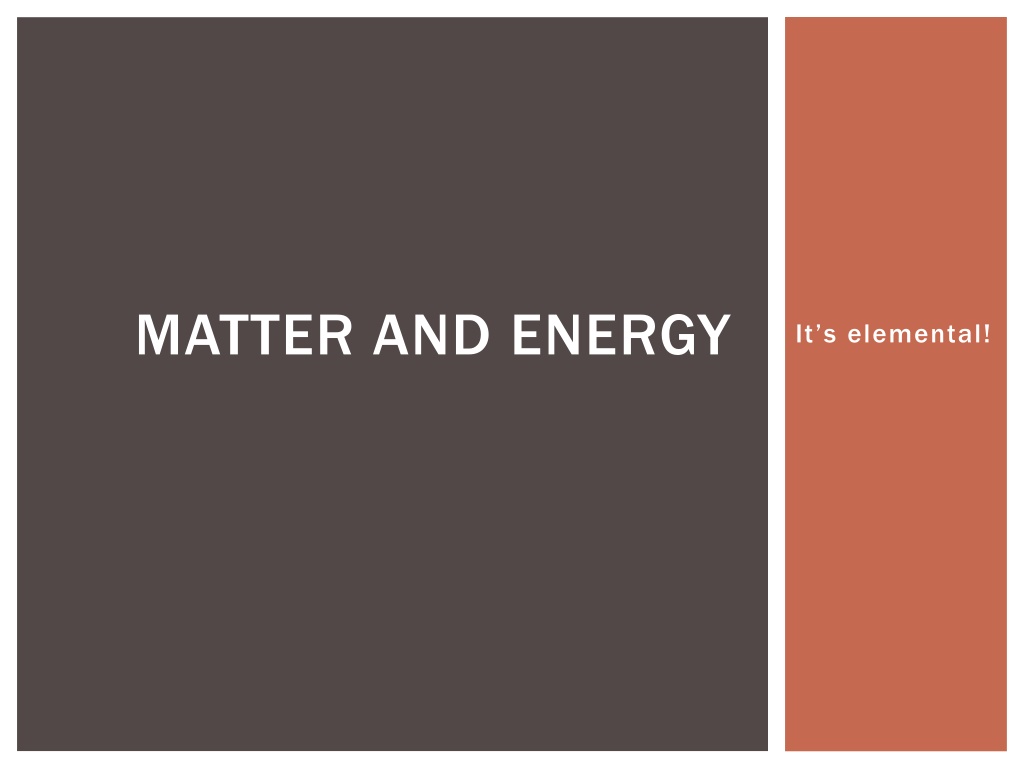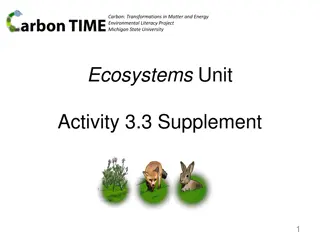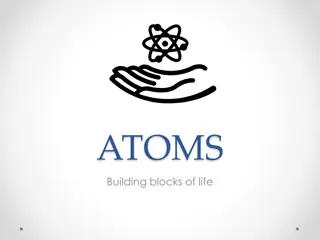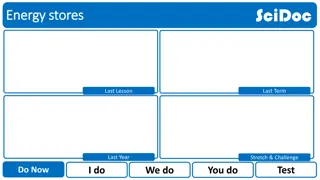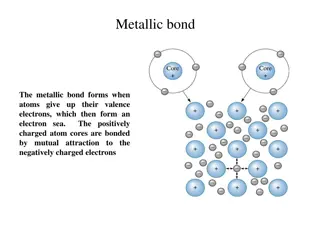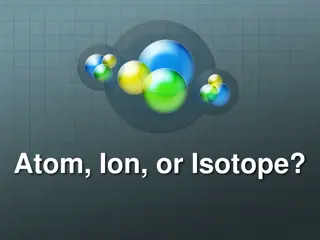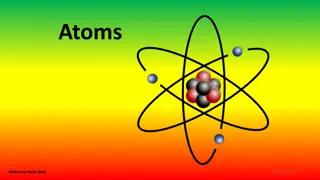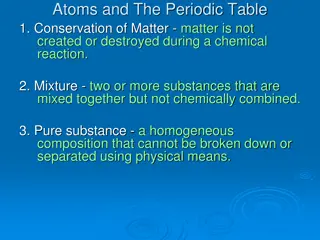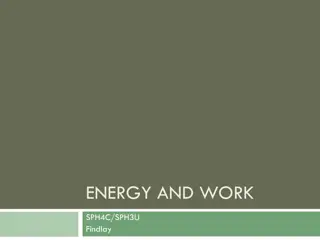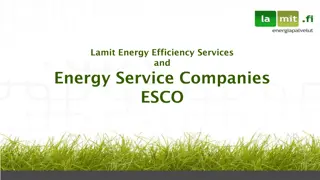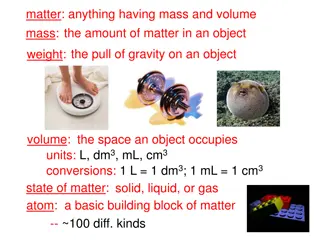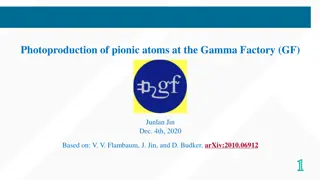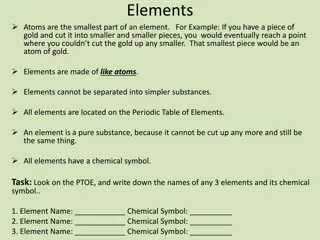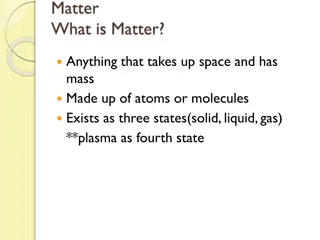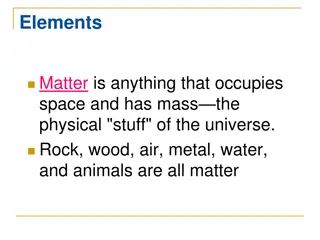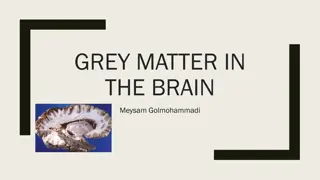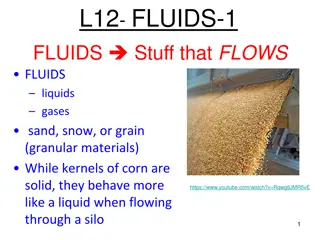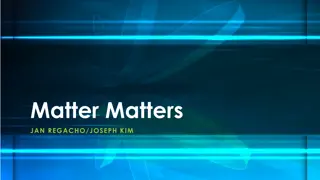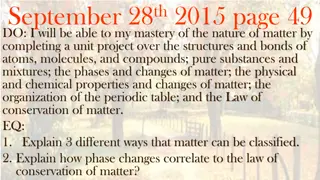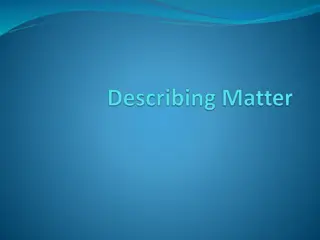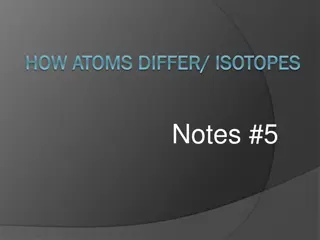Understanding Matter, Energy, Atoms, and Elements in Science
Explore the fundamental concepts of matter and energy, the structure of atoms, the properties of elements in the periodic table, and the classification of metals, nonmetals, and metalloids. Learn about compounds and mixtures and how they differ in composition and properties.
Download Presentation

Please find below an Image/Link to download the presentation.
The content on the website is provided AS IS for your information and personal use only. It may not be sold, licensed, or shared on other websites without obtaining consent from the author. Download presentation by click this link. If you encounter any issues during the download, it is possible that the publisher has removed the file from their server.
E N D
Presentation Transcript
MATTER AND ENERGY It s elemental!
ATOMS The most basic component of all matter. The smallest particle of an element that has ALL the chemical properties of that element. Made of a nucleus of protons and neutrons surrounded by electrons.
ELEMENTS Matter made of a SINGLE type of atom. They CANNOT be broken down into different kinds of matter. Quick Facts: 118 Elements known or predicted 90 formed by nature, 28 created in laboratories All are classified in the Periodic Table of the Elements
PERIODIC TABLE H = Hydrogen He = Helium Elements are written as symbols Usually represented by 1-2 letters The first letter is always capitalized The second letter is lower case
PERIODIC TABLE Columns Elements are arranged by atomic number 18 columns Represent families 7 Rows Represent periods Rows
PERIODIC TABLE Elements are divided by properties Metals on the left Shiny, conductors, malleable Nonmetals on the right Dull, not conductors, brittle Metalloids are the dotted stair step They have characteristics of both metals and nonmetals
METALS, NONMETALS, AND METALLOIDS Metals Metals Nonmetals Nonmetals Metalloids Metalloids Shiny Malleable Good conductors of heat and electricity Why?: They have the ability to easily move electrons to their outer shells. Ex: Al Aluminum Au Gold Dull Brittle Poor conductors of heat and electricity Why?: They gain electrons easily. Ex: Cl Chlorine Ne - Neon Have properties of both metals and nonmetals Good semiconductors Boiling points, melting points, and densities vary Ex: Si Silicon B - Boron
COMPOUNDS AND MIXTURES Mixture A substance containing two or more substances MIXED together. Can be separated by mechanical means. The two or more substances are mixed in a way that each remains UNCHANGED. Example: Salad Dressing Compound A substance formed from two or more elements with a fixed ration determining the composition. The elements lose their individual properties and the new compound has new properties. Examples: Water (Hydrogen and Oxygen) Salt (Sodium and Chlorine)
ELEMENTS ESSENTIAL TO LIFE CHONPS: CHONPS: C C H H O O N N P P S S arbon ydrogen xygen itrogen hosphorus ulfur These elements are found in abundance on solid Earth, in the atmosphere, and in the oceans.
THE EARTHS CRUST Notice how the same element, oxygen, makes up the majority of both the Earth s crust and the human body. This displays how essential oxygen is to both life and Earth.
ABUNDANCE OF ELEMENTS IN SOIL, SEA, AND PLANT LIFE The bar graph shows the abundance of elements in the Earth s crust, ocean, and plants. This graph shows that in addition to CHONPS there are other elements that occur frequently in the composition of life and earth. Can you name one of these elements besides CHONPS?
NOW ITS YOUR TURN TO TEST YOUR KNOWLEDGE! On the next few slides you will see a series of pictures, on your Matter and Energy student worksheet write if the picture represents an element, compound, or mixture. Element? Element? Compound? Compound? Remember: An element element contains just one type of atom. A compound compound contains two or more different atoms joined together. A mixture mixture contains two or more different substances physically joined together.
ELEMENT, COMPOUND, OR MIXTURE? Pure Water Pure Water
ELEMENT, COMPOUND, OR MIXTURE? Diamond Diamond
ELEMENT, COMPOUND, OR MIXTURE? Gold Gold
ELEMENT, COMPOUND, OR MIXTURE? Chex Mix Chex Mix
ELEMENT, COMPOUND, OR MIXTURE? Salt Salt
ELEMENT, COMPOUND, OR MIXTURE? Neon Neon
ELEMENT, COMPOUND, OR MIXTURE? Skittles Skittles
ELEMENT, COMPOUND, OR MIXTURE? Sugar Sugar
ELEMENT, COMPOUND, OR MIXTURE? Stir Stir- -Fry Fry
ELEMENT, COMPOUND, OR MIXTURE? Sand Sand
